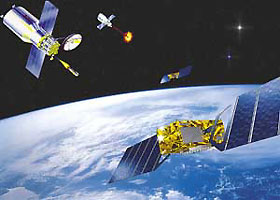The density in space is increasing, therefore accurate satellite navigation is necessary; The system developed by Technion researchers reaches an accuracy of a few centimeters

A consortium with the participation of the Technion participates in the "Galileo" project (global navigation satellite system of the European Union). This is the only consortium that has so far been privileged to participate in a project in the scientific field.
"The density in space is increasing, the movement of satellites is increasing and increasing, so there is a need for a 'traffic policeman' to prevent collisions between satellites in space," explains Dr. Pini Gurfil from the Faculty of Aeronautics and Space Engineering at the Technion, who participates in the "Galileo" project.
"We are developing software for the 'Galileo' receiver which will collect information from each and every satellite and will be able to calculate its position and relative speed, with an accuracy of a few centimeters. The system will activate and point the satellites automatically. In addition, the system will allow several satellites to work together ("structure flight")".
The "Galileo" administration segmented the consumer market: the commercial niche, the niche for civilian uses (such as rescue and rescue, air traffic control) and the scientific niche. The consortium with the participation of the Technion is the only one operating in the scientific niche. Chalmers University from Sweden, the Research Institute of the Czech Academy of Sciences, "Metofis" (the British Royal Meteorological Institute), the companies "Stralab" and "Atos Origin" from Spain and "Infermar" - an oceanographic research institute from France, also participate in it.
The "Galileo" project is actually the European GPS, which commits to a free service that is always available. The first satellite was launched as part of the project in December 2005 from Kazakhstan. The Europeans claim that the accuracy of the "Galileo" will be greater than the accuracy of the American GPS, the coverage in the north of the Earth will be improved and the indication of the user's location will be more reliable. At the end of the process, "Galileo" will have 30 satellites in three orbits (ten satellites in each orbit), and its cost will amount to billions of euros.
Participation in the scientific niche of the project is possible after winning a competition held by the "Galileo" administration, and so far only the consortium with the participation of the Technion has won it.
